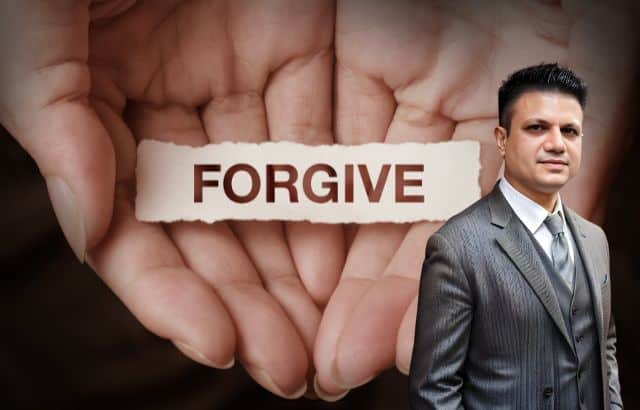Many people are searching for happiness, fulfillment, and peace of mind. But despite having countless opportunities, modern conveniences, and advancements, why do so many of us feel more stressed and less happy than ever before? This paradox is often fueled by our expectations—and the key to breaking free from this cycle lies in one of the most powerful tools we have: forgiveness.
Table of Contents
The Power of Forgiveness: A Gift to Yourself
We all have expectations of ourselves, our lives, and the people around us. Yet, these expectations are often the source of much of our suffering. Business strategist Hirav Shah, known as “The Game Changer,” has worked with millions of people across the globe, helping them understand the profound impact expectations can have on our mental and emotional well-being.
As Hirav Shah points out, “Life isn’t easy for anyone—no matter how much wealth, health, or opportunity someone has. The biggest roadblock to happiness is not external circumstances but the expectations we place on ourselves and others.”
Expectations: The Root Cause of Stress
In our search for happiness, many of us expect life and people to behave a certain way. We expect others to be kind, understanding, and loving, and when they fall short, we feel hurt and angry. The problem arises when we let these expectations control us, causing unnecessary stress and frustration.
For example, think about a time when a colleague or a friend didn’t meet your expectations. Perhaps you felt overlooked, hurt, or disappointed. This emotional turmoil is a result of holding on to an idea of how things “should” be, instead of accepting them as they are. When you release these expectations, you create space for peace and contentment.
How Forgiveness Transforms Your Life: Practical Insights
One of the key aspects of mental and emotional well-being is the ability to forgive—not only others but also ourselves. Forgiveness is often misunderstood as a way to absolve others of their wrongdoings. But, as Hirav Shah explains, true forgiveness is a gift to ourselves.
“Forgiveness isn’t about letting the other person off the hook. It’s about letting go of the heavy burden of anger, resentment, and hurt that we carry. It’s about freeing yourself so that you can move forward with a lighter heart,” Shah shares.
Real-Life Example of Forgiveness: Nelson Mandela’s Legacy
A powerful example of forgiveness is the life of Nelson Mandela. He spent 27 years in prison, unjustly incarcerated by the apartheid regime in South Africa. When he was released, he chose forgiveness over bitterness. Mandela famously said, “As I walked out the door toward my freedom, I knew that if I didn’t leave my bitterness and hatred behind, I’d still be in prison.”
Mandela’s decision to forgive those who imprisoned him was not just about letting go of anger—it was about his own freedom. By forgiving, he was able to move forward and play a pivotal role in the reconciliation and transformation of his country. His ability to rise above bitterness and hatred is an example of the ultimate power of forgiveness.
Managing Expectations: A Key Strategy for Stress Relief
Many of us are constantly disappointed because others don’t meet our expectations. But what if, instead of holding on to these expectations, we focused on appreciation? This simple shift can reduce stress and increase happiness.
Hirav Shah advises, “Trade your expectations for appreciation. The moment you do, your whole world transforms.”
When you appreciate what others bring to the table—rather than expecting them to act a certain way—you free yourself from the disappointment that often comes with unmet expectations. Think about the last time someone surprised you with a kind gesture. That feeling of joy and gratitude comes naturally when we let go of the need to control others’ behavior.
Steps to Truly Forgive and Let Go of Resentment
Forgiveness is a process, and it takes practice. Here are a few steps to help you embrace forgiveness in your life:
- Acknowledge the Hurt: The first step to forgiveness is recognizing that you’ve been hurt. Denying or suppressing your feelings will only prolong the pain.
- Let Go of Expectations: Understand that people are doing the best they can with the resources and mindset they have. Let go of the idea that they should behave a certain way to meet your standards.
- Choose Forgiveness: Remember, forgiveness is a choice. You don’t need an apology or a change of heart from others to forgive. Forgiving is about freeing yourself from the weight of anger and resentment.
- Embrace Gratitude: Start a daily gratitude practice. It’s impossible to feel angry and grateful at the same time. By focusing on what’s good in your life, you make room for forgiveness and healing.
The Science of Forgiveness: How It Benefits Your Body and Mind
Research has shown that holding on to negative emotions like anger and resentment can have a direct impact on your health. Biochemical changes in the body when we’re angry, such as the release of cortisol, stress hormones, and elevated blood pressure, can lead to long-term physical consequences, including poor cardiovascular health and reduced sleep quality.
On the other hand, forgiveness has been linked to improved cardiovascular health, better immune function, and longer life expectancy. Forgiving allows the body to return to a state of balance, free from the stress-induced damage of unresolved negative emotions.
How to Implement Forgiveness in Your Business Life
As a business strategist, Hirav Shah emphasizes the role of forgiveness in professional environments. Holding grudges against colleagues, clients, or competitors can stifle creativity, collaboration, and growth. Forgiving others in business doesn’t mean ignoring mistakes or unethical behavior; it means choosing to move forward with a clear mind and a focus on what’s important.
For instance, in the world of business, mistakes happen. Perhaps a client missed a deadline or a partner didn’t follow through on a commitment. Rather than holding on to resentment, use the situation as an opportunity for growth. Have a constructive conversation, set clear expectations, and move forward with a positive attitude. This mindset can transform not only your professional relationships but also your business outcomes.
FAQs About Forgiveness and Mental Well-being
1. What is the best way to forgive someone who hasn’t apologized?
Forgiveness is a personal choice. You don’t need an apology to forgive. Start by acknowledging your feelings, letting go of expectations, and choosing to free yourself from the burden of anger. The act of forgiveness is more about your own healing than about what others do.
2. How does forgiveness improve mental health?
Forgiveness reduces stress, lowers blood pressure, and improves sleep quality. It also promotes emotional well-being by helping you release negative emotions like anger, resentment, and bitterness, which can otherwise consume your thoughts and energy.
3. Can forgiveness really help in business?
Yes! Forgiveness in business fosters stronger, more resilient relationships. It allows you to move past misunderstandings, learn from mistakes, and build a culture of collaboration and trust.
4. How can I start practicing forgiveness?
Begin by practicing gratitude daily. Reflect on what you appreciate about your life and the people around you. With time, it becomes easier to let go of grudges and replace them with forgiveness.
Final Thoughts: The Key to a Fulfilling Life
Hirav Shah reminds us that forgiveness is not just about releasing others from their wrongs; it’s about giving ourselves the freedom to grow, learn, and evolve. By practicing forgiveness, we clear the mental and emotional clutter that keeps us stuck in negativity. And, as we let go of resentment, we make room for happiness, peace, and a more fulfilling life.
Ultimately, embracing forgiveness is about trusting that everything in life is happening for you, not to you. Even the most painful experiences have the potential to teach valuable lessons and contribute to your growth. When you choose to forgive, you take the first step toward transforming your mind, body, and soul. And that, in itself, is a game-changer.
About Hirav Shah:
Hirav Shah is an internationally recognized business strategist and thought leader. With over two decades of experience working with businesses around the world, he’s renowned for his ability to transform organizations and individuals through innovative strategies and personal growth. His holistic approach combines business acumen with a deep understanding of human psychology and emotional intelligence, helping people and companies achieve sustainable success.

















